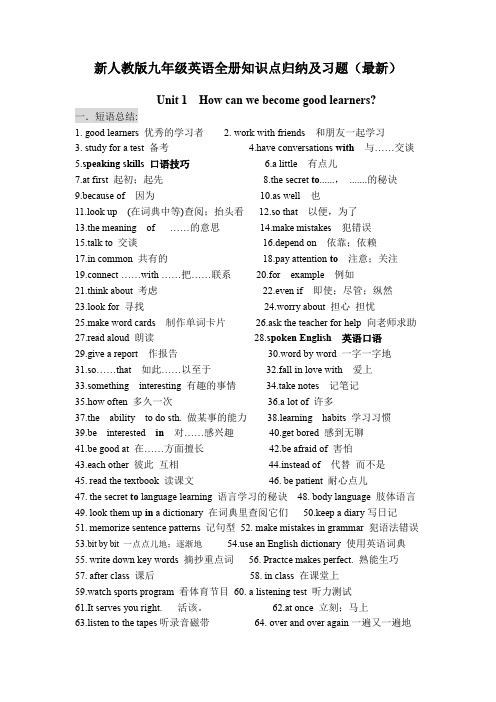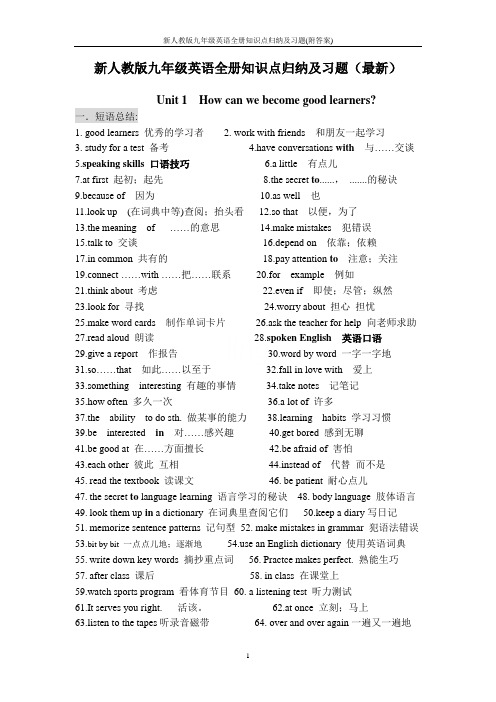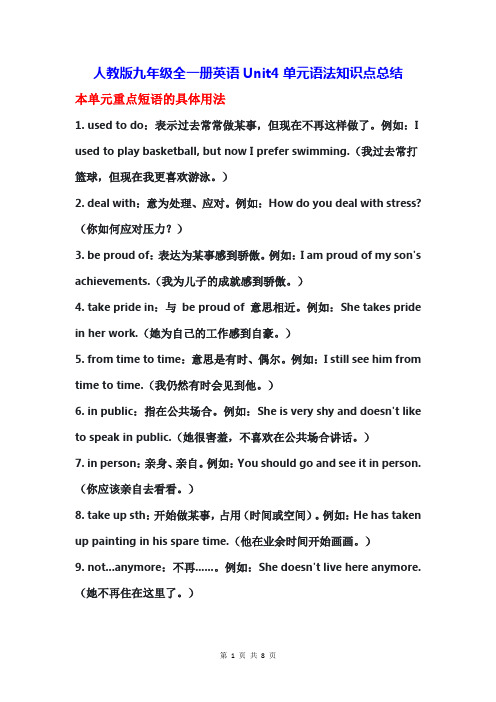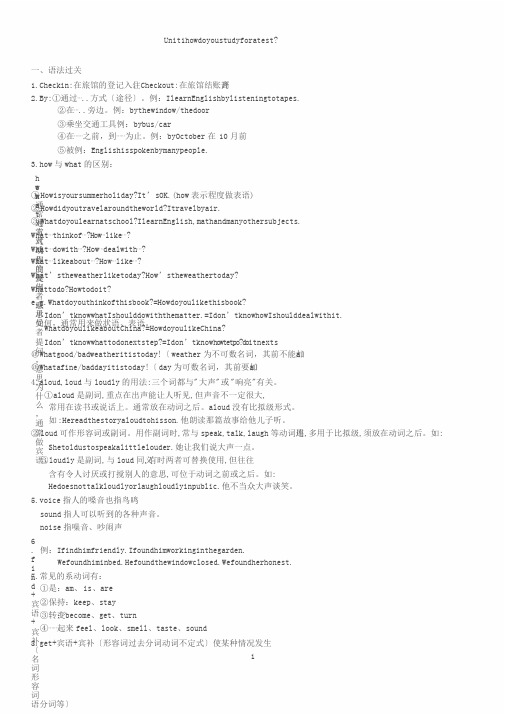人教版九年级英语各单元语法总结及练习
新人教版九年级英语全册知识点归纳1-3单元

新人教版九年级英语全册知识点归纳及习题(最新)Unit 1 How can we become good learners?一.短语总结:1. good learners 优秀的学习者2. work with friends 和朋友一起学习3. study for a test 备考4.have conversations with 与……交谈5.speaking skills 口语技巧6.a little 有点儿7.at first 起初;起先8.the secret to......,.......的秘诀9.because of 因为10.as well 也11.look up (在词典中等)查阅;抬头看12.so that 以便,为了13.the meaning of ……的意思14.make mistakes 犯错误15.talk to 交谈16.depend on 依靠;依赖17.in common 共有的18.pay attention to注意;关注19.connect ……with ……把……联系20.for example 例如21.think about 考虑22.even if 即使;尽管;纵然23.look for 寻找24.worry about 担心担忧25.make word cards 制作单词卡片26.ask the teacher for help 向老师求助27.read aloud 朗读28.spoken English 英语口语29.give a report 作报告30.word by word 一字一字地31.so……that 如此……以至于32.fall in love with 爱上33.something interesting 有趣的事情34.take notes 记笔记35.how often 多久一次36.a lot of 许多37.the ability to do sth. 做某事的能力38.learning habits 学习习惯39.be interested in对……感兴趣40.get bored 感到无聊41.be good at 在……方面擅长42.be afraid of 害怕43.each other 彼此互相44.instead of 代替而不是45.read the textbook 读课文46.be patient 耐心点儿47.the secret to language learning 语言学习的秘诀48.body language 肢体语言49.look them up in a dictionary 在词典里查阅它们50.keep a diary写日记51.memorize sentence patterns 记句型52. make mistakes in grammar 犯语法错误53.bit by bit 一点点儿地;逐渐地e an English dictionary 使用英语词典55.write down key words 摘抄重点词56.Practce makes perfect. 熟能生巧57.after class 课后58.in class 在课堂上59.watch sports program 看体育节目60. a listening test 听力测试61.It serves you right. 活该。
人教版九年级全一册英语Unit13单元语法知识点总结

人教版九年级全一册英语Unit13单元语法知识点总结本单元重点短语的具体用法1. at the bottom of the river:用于描述某物在河床底部的位置。
例如:The coin was found at the bottom of the river.(硬币在河床底部被发现。
)2. be full of the rubbish:表示充满了垃圾。
例如:The park is full of rubbish.(公园里充满了垃圾。
)3. throw litter into the river:意思是把垃圾扔入河中,用于描述一种不环保的行为。
例如:It's not good to throw litter into the river.(把垃圾扔入河中是不好的行为。
)4. play a part in cleaning it up:表示参与或在清理某物方面发挥作用。
例如:Everyone should play a part in cleaning up the environment.(每个人都应该参与清理环境。
)5. land pollution:指土地污染。
例如:Land pollution is a serious problem.(土地污染是一个严重的问题。
)6. fill the air with black smoke:用于描述使空气中充满黑烟的情况。
例如:The factory fills the air with black smoke.(工厂使空气中充满了黑烟。
)7. cut down air pollution:意思是减少空气污染。
例如:We need to cut down air pollution to protect our health.(我们需要减少空气污染来保护我们的健康。
)8. make a difference:表示产生影响或有所作为。
例如:Small actions can make a big difference.(小行动可以产生大影响。
新目标人教版英语九年级1-3单元语法总结

Unit11.How do you study for a test? 回答:By+doing sth2.ask sb for help 向某人求助3.what about=how about怎么样?4.practice+sth/doing sth5.it+is +adj+(for sb)+to do sth 对某人来说做某事是怎么样的6.the best way to do sth 做某事的好方法7.ask sb about sth, ask sb to do sth, ask sb not to do sth 8.end up doing sth9.which ,who, what 等不定代词+v不定式结构10.forget+n/to do sth/doing sth11.why not do sth=why don’t you do sth 12.learn to do sth,13.decide to do sth, 14.first of all, 15.help sb do sth 16..look up, 17.worry about18.changge…into 19.with the help of sb 20.be angry at/about sth,be angry with sb21.regard…as 22.try one’s best pare…to 24.instead of sth/doing sthUnit2ed to +v原型,表示过去常常;否定形式为used not to /didn’t use to,疑问句形式为提used到句首,或在句首+did2.be used to +n/pron/v-ing 习惯于做某事3.be used to do sth/be used for doing sth被用来做某事4.I go to sleep (with my bedroom light on.)做伴随状语。
新人教版九年级英语全册知识点归纳及习题(附答案)

新人教版九年级英语全册知识点归纳及习题(最新)Unit 1 How can we become good learners?一.短语总结:1. good learners 优秀的学习者2. work with friends 和朋友一起学习3. study for a test 备考4.have conversations with 与……交谈5.speaking skills 口语技巧6.a little 有点儿7.at first 起初;起先8.the secret to......,.......的秘诀9.because of 因为10.as well 也11.look up (在词典中等)查阅;抬头看12.so that 以便,为了13.the meaning of ……的意思14.make mistakes 犯错误15.talk to 交谈16.depend on 依靠;依赖17.in common 共有的18.pay attention to注意;关注19.connect ……with ……把……联系20.for example 例如21.think about 考虑22.even if 即使;尽管;纵然23.look for 寻找24.worry about 担心担忧25.make word cards 制作单词卡片26.ask the teacher for help 向老师求助27.read aloud 朗读28.spoken English 英语口语29.give a report 作报告30.word by word 一字一字地31.so……that 如此……以至于32.fall in love with 爱上33.something interesting 有趣的事情34.take notes 记笔记35.how often 多久一次36.a lot of 许多37.the ability to do sth. 做某事的能力38.learning habits 学习习惯39.be interested in对……感兴趣40.get bored 感到无聊41.be good at 在……方面擅长42.be afraid of 害怕43.each other 彼此互相44.instead of 代替而不是45.read the textbook 读课文46.be patient 耐心点儿47.the secret to language learning 语言学习的秘诀48.body language 肢体语言49.look them up in a dictionary 在词典里查阅它们50.keep a diary写日记51.memorize sentence patterns 记句型52. make mistakes in grammar 犯语法错误53.bit by bit 一点点儿地;逐渐地e an English dictionary 使用英语词典55.write down key words 摘抄重点词56.Practce makes perfect. 熟能生巧57.after class 课后58.in class 在课堂上59.watch sports program 看体育节目60. a listening test 听力测试61.It serves you right. 活该。
人教版九年级全一册英语Unit4单元语法知识点总结

人教版九年级全一册英语Unit4单元语法知识点总结本单元重点短语的具体用法1. used to do:表示过去常常做某事,但现在不再这样做了。
例如:I used to play basketball, but now I prefer swimming.(我过去常打篮球,但现在我更喜欢游泳。
)2. deal with:意为处理、应对。
例如:How do you deal with stress?(你如何应对压力?)3. be proud of:表达为某事感到骄傲。
例如:I am proud of my son's achievements.(我为儿子的成就感到骄傲。
)4. take pride in:与be proud of 意思相近。
例如:She takes pride in her work.(她为自己的工作感到自豪。
)5. from time to time:意思是有时、偶尔。
例如:I still see him from time to time.(我仍然有时会见到他。
)6. in public:指在公共场合。
例如:She is very shy and doesn't like to speak in public.(她很害羞,不喜欢在公共场合讲话。
)7. in person:亲身、亲自。
例如:You should go and see it in person.(你应该亲自去看看。
)8. take up sth:开始做某事,占用(时间或空间)。
例如:He has taken up painting in his spare time.(他在业余时间开始画画。
)9. not...anymore:不再......。
例如:She doesn't live here anymore.(她不再住在这里了。
)10. worry about:担心、担忧。
例如:Don't worry about the exam, just do your best.(不要担心考试,尽力就好。
人教版九年级上册英语1-3单元知识点与其配套练习题

Unit1howdoyoustudyforatest?一、语法过关1.Checkin:在旅馆的登记入住。
Checkout:在旅馆结账离开。
2.By:①通过⋯..方式〔途径〕。
例:IlearnEnglishbylisteningtotapes.②在⋯..旁边。
例:bythewindow/thedoor③乘坐交通工具例:bybus/car④在⋯⋯之前,到⋯⋯为止。
例:byOctober 在10月前 ⑤被例:Englishisspokenbymanypeople.3.how 与what 的区别:h o w 通常对方式或程度提问,意思如何,通常用来做状语、表语。
w h a t 通常对动作的发出者或承受者提问,意思为什么,通常做宾语。
①Howisyoursummerholiday?It ’sOK.(how 表示程度做表语) ②Howdidyoutravelaroundtheworld?Itravelbyair. ③Whatdoyoulearnatschool?IlearnEnglish,mathandmanyothersubjects. What ⋯thinkof ⋯?How ⋯like ⋯? What ⋯dowith ⋯?How ⋯dealwith ⋯? What ⋯likeabout ⋯?How ⋯like ⋯? What ’stheweatherliketoday?How ’stheweathertoday? Whattodo?Howtodoit? e.g.Whatdoyouthinkofthisbook?=Howdoyoulikethisbook? Idon ’tknowwhatIshoulddowiththematter.=Idon ’tknowhowIshoulddealwithit. WhatdoyoulikeaboutChina?=HowdoyoulikeChina?Idon ’tknowwhattodonextstep?=Idon ’tknowh owtetp o?doitnexts ㊣Whatgood/badweatheritistoday!〔weather 为不可数名词,其前不能加a 〕 ㊣Whatafine/baddayitistoday!〔day 为可数名词,其前要加a 〕 4.aloud,loud 与loudly 的用法:三个词都与"大声"或"响亮"有关。
人教版九年级全一册英语Unit9单元语法知识点总结

人教版九年级全一册英语Unit9单元语法知识点总结本单元重点短语的具体用法1. dance to (music):随着(音乐)跳舞- The children danced to the music at the party.(孩子们在派对上随着音乐跳舞。
)2. sing along with:随着...一起唱- I like to sing along with the radio.(我喜欢随着收音机一起唱歌。
)3. musicians who play different kinds of music:弹奏不同类型音乐的音乐家- The band has musicians who play different kinds of music, including pop and jazz.(这个乐队有弹奏不同类型音乐的音乐家,包括流行音乐和爵士乐。
)4. electronic music:电子音乐- Electronic music is becoming more and more popular.(电子音乐越来越受欢迎。
)5. not much:没什么(事)- - How are you? - Not much.(- 你好吗?- 没什么事。
)6. suppose sb to do sth.:猜想某人做某事- I suppose him to be a doctor.(我猜他是个医生。
)7. be supposed to do sth:应该做某事- You are supposed to hand in your homework on time.(你应该按时交作业。
)8. suppose sb (to be) + adj.:原以为...- I supposed her to be honest, but I was wrong.(我原以为她是诚实的,但我错了。
)9. have spare time:有空闲时间- I don't have much spare time these days.(我最近没有太多空闲时间。
人教版九年级英语Unit 11语法总结

人教版九年级英语Unit 11语法总结1. 一般将来时(Simple Future Tense)- 表示将要发生的动作或存在的状态。
- 结构:主语 + will + 动词原形。
- 示例:- I will go to the party tomorrow.- She will help me with my homework.2. 现在进行时(Present Continuous Tense)- 表示现在正在进行的动作。
- 结构:主语 + am/is/are + 现在分词。
- 示例:- We are watching a movie right now.- They are playing football in the park.3. 现在完成时(Present Perfect Tense)- 表示过去发生的动作对现在有影响或结果。
- 结构:主语 + have/has + 过去分词。
- 示例:- I have finished my homework.- She has visited Paris.4. 过去时(Simple Past Tense)- 表示过去发生的动作或存在的状态。
- 结构:主语 + 动词过去式。
- 示例:- He studied English last night.- They visited their grandparents during the summer vacation.5. 动词不定式(Infinitive)- 用于表示目的、愿望、打算等。
- 结构:to + 动词原形。
- 示例:- She plans to travel around the world.- 用于比较两个或多个事物的大小、程度、数量等。
- 示例:- He is taller than his brother.- This is the most delicious cake I have ever had.7. 疑问句(Question Sentences)- 用于询问信息、意见、建议等。
- 1、下载文档前请自行甄别文档内容的完整性,平台不提供额外的编辑、内容补充、找答案等附加服务。
- 2、"仅部分预览"的文档,不可在线预览部分如存在完整性等问题,可反馈申请退款(可完整预览的文档不适用该条件!)。
- 3、如文档侵犯您的权益,请联系客服反馈,我们会尽快为您处理(人工客服工作时间:9:00-18:30)。
人教版九年级英语各单元语法总结及练习第一讲知识目标:1.提建议的表达方法2. aloud,loud与loudly的用法重点:提建议的表达方法难点:aloud, loud与loudly的用法Unit 1 How do you study for a test点击要点1.by + doing 通过……方式如:by studying witha groupby 还可以表示:“在…旁”、“靠近”、“在…期间”、“用、”“经过”、“乘车”等如:I live by theriver. I havetogo backby teno’clock.Thethief entered theroom by the window.The studentwent toparkby bus.2. talk about 谈论,议论,讨论如:The students often talk about movieafter class.学生们常常在课后讨论电影。
talk to sb.=== talkwith sb. 与某人说话3.提建议的句子:①What/ how about +doingsth.?如:What/ How about going shopping?②Why don’t you+ do sth.? 如:Whydon’t you goshopping?③Why not+do sth. ? 如:Why not go shopping?④Let’s + do sth.如: Let’s go shopping⑤Shallwe/ I+dosth.?如:Shall we/ Igoshopping?4.alot许多常用于句末如:I eata lot.我吃了许多。
5.too…to 太…而不能常用的句型too+adj./adv. + to do sth.如:I’m too tiredto sayanything.我太累了,什么都不想说。
6.aloud,loud与loudly的用法三个词都与"大声"或"响亮"有关。
①aloud是副词,重点在出声能让人听见,但声音不一定很大,常用在读书或说话上。
通常放在动词之后。
aloud没有比较级形式。
如:He read thestory aloud to his son.他朗读那篇故事给他儿子听。
②loud可作形容词或副词。
用作副词时,常与speak,talk,laugh等动词连用,多用于比较级,须放在动词之后。
如:She toldus to speak a little louder.她让我们说大声一点。
③loudly是副词,与loud同义,有时两者可替换使用,但往往含有令人讨厌或打扰别人的意思,可位于动词之前或之后。
如:He does nottalkloudly or laugh loudlyinpublic. 他不当众大声谈笑。
7. not …atall 一点也不根本不如:Ilike milkverymuch.I do n’t likecoffee at all. 我非常喜欢牛奶。
我一点也不喜欢咖啡。
not经常可以和助动词结合在一起,at all 则放在句尾8. be / get excited aboutsth.=== be /get excitedabout doing sth.=== be excited todo sth. 对…感兴奋如:I am/ getexcitedabout going to Beijing.===I am excited togo to Beijing. 我对去北京感到兴奋。
9.① end up doing sth 终止做某事,结束做某事如:Theparty ended up singing.晚会以唱歌而结束。
② end up with sth. 以…结束如:Theparty endedup withhersinging. 晚会以她的歌唱而告终。
10. first of all 首先. tobegin with一开始later on后来、随11. also也、而且(用于肯定句)常在句子的中间either 也(用于否定句)常在句末too 也(用于肯定句) 常在句末12. makemistakes犯错如:I often make mistakes. 我经常犯错。
make a mistake犯一个错误如:I have madea mistake.我已经犯了一个错误。
13. laughatsb. 笑话;取笑(某人) 如:Don’t laugh at me!不要取笑我!14. take notes做笔记,做记录15. enjoy doing sth. 喜欢做…乐意做… 如:She enjoys playingfootball.她喜欢踢足球。
enjoyoneself 过得愉快如:He enjoyedhimself.他过得愉快。
16. native speaker 说本族语的人17. make up 组成、构成18. one of +(the+形容词比较级)+名词复数形式…其中之一如: Sheisone of the most popular teachers.她是最受欢迎的教师之一。
19. It’s +形容词+(forsb.) to do sth.(对于某人来说)做某事…如:It’s difficult (for me) to studyEnglish.对于我来说学习英语太难了。
句中的it是形式主语,真正的主语是to studyEnglish20. practicedoing练习做某事如:She often practice speaking English. 她经常练习说英语。
21. decide to do sth.决定做某事如:LiLei has decided togoto BeiJing . 李雷已经决定去北京。
22. unless假如不,除非引导条件状语从句如:You will fail unless you workhard..假如你不努力你会失败。
I won’t writeunless he writesfirst. 除非他先写要不我不写23.deal with处理如:I dealt with alot of problem.24. worryabout sb./ sth.担心某人/ 某事如:Mother worried abouthis son just now.妈妈刚才担心他的儿子。
25. be angry with sb. 对某人生气如:I wasangry withher. 我对她生气。
26. perhaps ===maybe 也许27.go by (时间) 过去如: Two years went by.两年过去了。
28.seesb. /sth.doing 看见某人正在做某事强调正在发生seesb. /sth.do看见某人在做某事如:如:She sawhim drawinga picture in the classroom.她看见他正在教室里画画。
29.each other彼此30. regard…as… 把…看作为….如:The boysregarded Annaasa fool.这些男孩把安娜看成傻瓜。
31.too many 许多修饰可数名词如:too many girlstoomuch许多修饰不可数名词如:too muchmilkmuch too太修饰形容词如:much toobeautiful32.change…into…将…变为…如:The magician changed thepen into a book.这个魔术师将这本书变为一本书。
33.withthe help of sb.==withone’s help 在某人的帮助下如:with the help of LiLei == with LiLei’s help在李雷的帮助下34. compare… to …把…与…相比如:Compare you toAnna, you arelucky.你和安娜相比,你是幸运的。
35. instead代替用在句末,副词(字面上常不译出来)instead of sth./ doing sth.代替,而不是用在句中,动词如:Last summer Iwent to Beijing.This year I’mgoing to Shanghaiinstead.去年夏天我去北京, 今年我将要去上海。
I willgo insteadofyou. 我将代替你去。
Hestayedat home instead ofgoing swimming.他呆在家里而不是去游泳。
基础巩固一单项选择( )1.---- How do you study______ a test?---- I study ______ working witha group.A:forby B:by inC: for from( )2.Have you ever ______ with a group?A: studyB:studying C:studied( )3.My sistersaid she studied by ________English-language videos.A:watch B:watchingC:watched()4.What about_______thetextbook?A: readingB: readC: toread()5.It improves my_______skillsA:spokenB: speakC: speaking()6.Ihave trouble ________ thenew words.A: memorize B:memorizing C:tomemorize()7.Idon’t know how ________ commas.A:use B: to usedC: used()8.Miss Li regards all his students _______ hischildren.A: as B: forC: to()9.If you don’tknow how tospell new words, look them _____ inadictionary.A: up B:for C:after()10.The small boysdecided________ toeachother.A:not talk B: not talkingC: not to talk三.完形填空(10分)I likeEnglish very much.Ithink Englishis very important and 1 . Hereare my opinions of 2Englishwell.Ithink there aremanyways3learnEnglish.For example, askingthe teacher 4help is very helpful.One of my good5said he hadtrouble 6 English.His7En glish is very poor.So he readsaloud everymorning.Now he canspeak Englishvery well.WatchingEnglishshows on TV can also behelpful. Youcan learn many words8 them. Remember “Where thereisa9, there is a way.” Believe you can do it10 .( )1.A:useful B: use C:used()2.A: learnB:learns C: learning( )3.A:to B: for C: of( )4.A:to B: for C: of()5.A:friend B: a friend C: friends()6.A: learn B: learning C: tolearn()7.A: speakB:spoken C: speaking()8.A:by B: in C:from()9.A: shall B: can C: will( )10.A: well B: good C: bad四.阅读理解(20分)AThisweek weasked students at NewStar High Schoolabout thebest ways to learnmore Engli sh.Manysaid theylearntby using English. Some students had more specific suggestions.LillianLi,for example,said the best way to learn new words wasby readingEnglish magazines. She said thatmemorizingthe words ofpop songs also helpeda little.When we asked about studying grammar,she said, “I neverstudy grammar. It’s too boring.”WeiMingfeelsdifferently.He’s been learning Englishfor six years andreally lovesit.H ethinks studyinggrammar is a greatway tolearn a language. He also thinksthatwatching English movies isn’t a bad way because hecan watchtheactors say the words.Sometimes,however, he finds watching movies frustrating becausethe people speak tooquickly.Liu Chang said thatjoining the English clubat school was thebestway to improve herEnglish.Studentsget lots of practice and they also havefun.She addedthat having conversations with friends was not helpfulat all. “We get excitedabout something and then end up speaking inChin ese,”she said.阅读文章,判断下列句子是否正确,正确的写“T”,错误的写“F”( )1. Lilian Li thought thebest waytolearnnew wordswas bymemorizingthem.()2.Lilian Li neverstudiedgrammar.( )3.Wei Minghas learned English forseventy-two months.( )4.Joining theEnglishclub at school was LiuChang’sbest wayto improveherEnglish.( )5.Liu Changthought havingconversations with friends was helpful.B根据日历选择正确答案( )1.Whatactivity does the Community Center haveonTuesday?A:Chess Club Meeting B: Bing go C: Movie( )2. When is the sewing class?A:onMondayB:OnFriday C: On Wednesday()3.What time does the movie start on January 9?A:9pm B: 8pmC.10-11pm()4. If youwant to goto Shopping Trip, whencan yougo?A: On Jan 11 B:On Tuesday 7-9pm C.On Jan27 ()5. What is happeningon Jan 20?A:Dance ClassB: Dinner andDancing C:Shopping Trip 五.翻译句子(10分)1.I study by readingthe textbook.______________________________________________________________.2.I can’t pronouncesomeofthenew words._______________________________________________________________.3.Itwasn’t easyfor meto understand the teacher when she talked._______________________________________________________________.4.Hethinks making flashcards isa goodway tolearn English._______________________________________________________________.5.Tom said studying grammar is not helpful at all.________________________________________________________________.六.根据中文完成句子(10分)1.我的叔叔经常询问我的学习情况。
